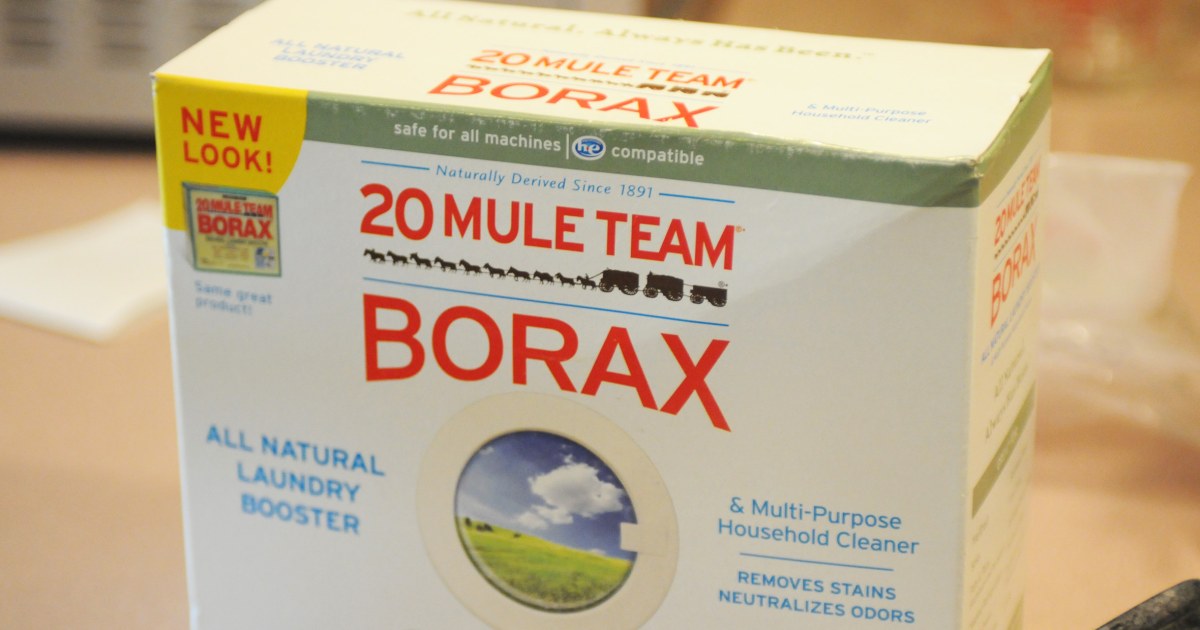
At least twice a month, Dr. Kelly Johnson-Arbor finds herself debunking a viral social media trend that could jeopardize people’s health. This week it’s borax.
The powdery substance is found in laundry detergent and sold on its own as a cleaning product. Boric acid, a different formulation of the same compound — boron — is also used to kill ants and cockroaches.
Borax has been banned in U.S. food products, but some people on TikTok have falsely suggested that adding a pinch of it to their water could reduce inflammation and help with joint pain, or that soaking in borax in the bathtub could “detoxify” the body. Several influencers with hundreds of thousands of followers on TikTok recommended borax in videos that have since been taken down.
Johnson-Arbor, a toxicology physician and co-medical director at the National Capital Poison Center, routinely writes articles for the center’s website that correct the record about dangerous health fads.
Borax, she said, can cause stomach irritation and potentially result in blue-green vomit or diarrhea if ingested. Over time, it can cause anemia and seizures, she said, and that soaking in borax could cause rashes that make the skin appear as bright pink as a boiled lobster and start to fall off.
“There’s really nothing to support the use of borax in humans for inflammation or reduction of oxidative stress or anything like that,” Johnson-Arbor said.
As health misinformation continues to proliferate on TikTok, a growing group of medical professionals has felt compelled to alert people, on and off the platform, about the dangers of these so-called hacks and alternatives.
Last month, Johnson-Arbor said she wrote an article warning about berberine, a dietary supplement for weight loss that some on TikTok dubbed “nature’s Ozempic,” but which is known to cause gastrointestinal problems.
Similarly, some social media hype about the weight-gain supplement apetamin has suggested it can make people “slim-thick,” meaning it can give people a thin waist and large behind. But it contains an antihistamine, and the Food and Drug Administration has warned that apetamin is illegally imported and may cause dizziness, sleepiness, irregular heartbeat and liver injury.
Then there’s the trend of inhaling smelling salts — popularized on TikTok by a company called Nose Slap — which can be poisonous when done incorrectly or over long periods of time, and the buzzy PRIME energy drink whose caffeine content is equivalent to roughly six Coca-Cola cans.
A spokesperson for TikTok did not immediately respond to a request for comment on Friday. The platform outlines guidance on combatting misinformation in its community guidelines, which it says are enforced using “a combination of technology and moderation teams.”
“If fact-checkers determine content to be false and we deem it to be in violation of our policies, we may remove the video from our platform or make the video ineligible for recommendation into For You feeds,” TikTok says in its guidelines.
Wendy Stephan, an epidemiologist at the Florida Poison Information Center, said it makes sense that people are drawn to these types of health fads. Prescription medications can be expensive or in short supply, she said, and people can’t always get appointments with doctors right away, so many look for quick, easy fixes.
On TikTok in particular, Stephan said, creators’ advice sounds plausible and is presented with fun visuals.
“When there’s somebody who seems very personable and credible telling you that ‘this worked for me and it’s great,’ I can see how people find that appealing,” she said.
But she emphasized that creators behind bogus health videos “are also making money from these posts — they’re getting a lot of eyeballs.”
And misinformation about personal health can, of course, be dangerous, Stephan continued.
“We have seen deaths associated with borax. It’s very rare, but that is a possibility. This is not a benign substance,” she said.
Johnson-Arbor said some social media trends stem from a misinterpretation of scientific research. In the case of borax, some TikTok creators cited one researcher’s claim that boron is “an essential nutrient for healthy bones and joints.”
Health misinformation on social media often centers on the same few themes, Johnson-Arbor said.
In addition to losing weight and improving their appearance, “everybody wants to have better sleep,” she said. “Everybody wants to live longer. Everybody wants to have decreased inflammation.”
Stephan said poison centers often make their own social media posts to combat misinformation, but “we don’t have the traction that a lot of these influencers do.”
Nor do most physicians, who don’t have the time or resources to crusade against dangerous viral trends.
But a few have taken it upon themselves to speak out nonetheless.
Dr. Meghan Martin, a pediatric emergency medicine physician and a health educator on TikTok, said that in her videos warning users against misinformed trends, she tries to use accessible, jargon-free language.
“I also think it’s important to try not to attack people. I really want to be level-headed, even-keeled and address things in a nonjudgmental way that is authentic,” she said.
Carlo Ledesma, a medical laboratory professional who occasionally shares his expertise on TikTok, said he began seeing videos about people drinking borax earlier this year.
“Just please do not ingest this!” he captioned a TikTok about it in April.
Warning about borax’s possible consequences felt like a necessary public service, he said.
“There are children on this app. There are parents watching this that are not medical professionals,” Ledesma said, adding: “As a medical professional, we swore an oath to protect the interests of the greater good.”






